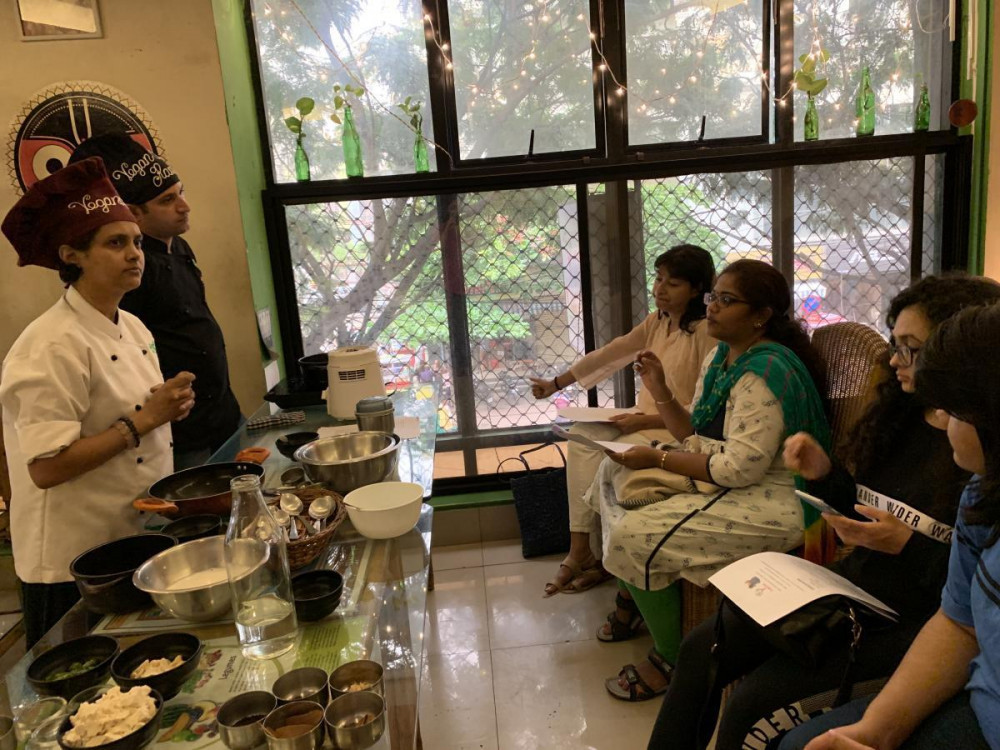Indian Vegan Society
Indian Vegan Society – New: Satvik Vegan Society
India is a country with rich cultural diversity. For centuries, vegetarianism has been practiced in many different religions. However, it's only within the last few years that veganism has also become popular among Indians who have an interest in ethical and moral issues.
These are some of the reasons why India has recently seen an increase in vegan restaurants, vegan festivals, and vegan events. The Satvik Vegan Society (formerly Indian Vegan Society) is a nonprofit organization. It was founded in 2004 by Shankar Narayan.
India is a country of ancient traditions and customs. One such tradition is the Indian vegetarian lifestyle, which is found in many cultures in India. People for years have practiced this way of life and adhered to it as a religion.
However, with an ever-growing population, this tradition has become increasingly difficult to maintain due to the lack of resources to feed everyone. This society discusses ways in which they are trying to move towards a more sustainable future as an alternative way of living that doesn't involve animal products at all.
There is a growing vegan community in India. Veganism is popular among Indian citizens and vegetarians are becoming more common. With this new emerging trend, the Indian vegan society is one of the fastest-growing communities in the country. Vegetarianism has always been a part of Indian culture and with this community, it has taken on a new meaning.
The rise of veganism in India will have long-term effects on our environment, health and economy. In India, there are more than 5,000 vegan societies. Veganism has been in the country for a long time and is slowly gaining popularity. People from all over the world come to India to learn about what it means to be vegan.
For a long time, several zealous friends – both Indian and European – have been using their influence for the establishment and promotion of Vegetarian principles, and the formation of organizations to carry on this work. Some of these friends combined a few years ago to form a society, but the support accorded was inadequate, and the society did not long continue in existence.
The spirit which animated these friends, was, however, unquenched; and as time has passed along, new sympathizers have been enlisted, the number of willing workers and supporters has increased, and now another effort has been made in Bombay, and we hear from Mr. D. D. Jassawalla that the “Natural Living Vegetarian Society” has been brought into existence. It combines in its founders both Indians and Europeans and is open to receive all who will join it without distinction of race.
The friend to whose influence the former effort was due is Mr. Byramji D. Panday, who is the treasurer of this new society, the president being Mr. D. Gostling, and the hon. secretary Mr. Jassawalla. The society's formation has been noticed in some of the Indian papers, and in one is an article “by an occasional reporter,” which is apparently intended to poke fun at the new Vegetarian Society by announcing a meeting to start ” A Beefsteak and Mutton Chop Society” for Bombay.
The chairman of the meeting is represented as proposing “that the society shall be called ‘The Society of Unnatural Livers' in order to be distinguished from the ‘Natural Life Vegetarian Society' recently started”.
Veganism In India
But the rise of veganism in India is not limited to just vegetarians. In fact, with an increasing number of people adopting a vegan diet, it's no surprise that veganism is becoming more and more mainstream. According to the United Nations Disaster Risk Management Division (UNDRMD), India has one of the highest rates of animal protein consumption in the world and this is largely due to its huge population.
The average Indian eats 7 kilograms of meat per year! This translates into 3-5 kilograms of meat per person per year. This amounts to over 17 million metric tons (MT) a year! Before we delve into how being vegan can improve your life on a practical level, it's important to consider what an impact this will have on our environment and health.
Overfishing for fish is a major problem in many parts of the world and unsustainable fishing methods are contributing to marine pollution, which can negatively affect human health by causing food insecurity through increased malnutrition or even death from diseases such as Malaria. In addition to overfishing, there has been an increase in wild animals dying from disease due to poor sanitation and hygiene practices.
Veganism is gaining in popularity in India. This trend is also growing more and more popular with people of all ages. Although there are many vegans on the streets of India, vegans are not a new trend. In fact, veganism has been around for centuries among Indian cultures. With the rise in popularity of veganism, the need for access to vegan products has grown as well.
According to the Ministry of Health, about one-third of India's population is vegetarian or vegan. This means that there are plenty of consumers who want to make sure they can get good quality products from local producers and restaurants that treat animals properly. So now more and more people are becoming aware of this incredible opportunity and choosing to go vegan instead.
How Veganism Can Help You
Veganism is an eating style that is based on the idea that the primary purpose of eating animals is for food. As a result, it's not only about avoiding meat, but also dairy, eggs and honey. A vegan diet doesn't include any animal products — they are just not included in your diet. You can be a vegan and still enjoy most of the foods you typically eat or consume separately or in small portions. You'll improve your health by avoiding unhealthy fats and sugars.
Being vegan will help reduce your risk of diabetes, heart disease and other illnesses that can affect your heart as well as reduce exposure to harmful chemicals like pesticides, hormones and antibiotics that pose potential dangers to your body if consumed regularly.
Veganism is becoming more common in India. One of the reasons for this growing interest may be the increasing availability of vegan products. According to a 2015 report by The New York Times, vegan food accounts for about 10 percent of India's economy. The report also found that vegetarianism has been growing rapidly in India's cities because there are many restaurants and food outlets specializing in Indian vegetarian cuisine.
According to an article published on CNN, an estimated two million vegetarians live in India, making it one of the largest vegetarian populations in the world. To maintain a healthy lifestyle, most people need to consume plant-based foods and drinks at least twice a day.
However, eating more than six times a day can cause harmful side effects because animal proteins break down the body's digestive system and can lead to stomach aches, indigestion and other problems. Many people need help staying vegan so they don't have these side effects from eating their regular meals every day.
The Indian Vegan Society
India is a large country and there are more than 1.3 billion people living in the entire landmass of the whole country. One of the reasons why so much water has to go through crops (for example, to make food) is because it takes too much of the country's precious water supply, leaving less for humans. Veganism is becoming more and more common among Indian citizens. The meaning behind veganism will have long-term effects on our environment, health and economy.
Vegetarianism is a movement that focuses on food and other ethical issues. Vegetarians are people who do not eat meat, fish, poultry, dairy or eggs. Many of India's top chefs and restaurants specialize in vegetarian cuisine. Companies are also starting to market their products as vegan as well. As more and more vegetarians come out of the closet, India will become a more diverse country with many different dietary choices.
What Percentage Of India Is Vegan?
The number of vegans in India is growing steadily. According to a report published by the BBC, India has more than 1 million vegans and vegetarians, with a difference between this group of people and the rest of the population. This statistic demonstrates that there are thousands of vegetarians and vegan people in India. If you're trying to get people to adopt a vegan lifestyle, you'll have an easier time gaining support from this large community.
This can help both you and your customers. A study published by the International Vegetarian Union (IVU) showed that vegetarians are more likely to live longer, become obese less frequently and be hospitalized less often than non-vegetarians. In addition, their average life expectancy is significantly higher than non-vegetarians as well as those who do not eat meat at all.
The Indian vegan community is growing quickly. According to a recent survey, about 2.6 percent of the population in India are vegans. The statistic was made public by the Vegetarian Association of India (VAI) and their research shows that India is one of the top countries for vegans worldwide.
Veganism has become an important part of Indian culture and there is a growing number of vegetarians who want to adopt this lifestyle. Veganism is becoming more mainstream in India and it's changing people's lives for the better. It's estimated that 100 million Indians will be vegan by 2023, according to a study conducted by Professor Sudhir Anand from the University of California at Los Angeles (UCLA).
Which City Has The Most Vegans In India?
Veganism is gaining popularity in India. It's a growing trend, and there are now more vegetarians than meat-eaters in the country. But which city has the largest number of vegans? According to a study by The Vegetarian Resource Group, vegan food is most popular in Delhi, Mumbai and Bangalore.
The Vegetarian Resource Group estimates that
- Delhi has as many as 60 percent of Indians who follow a vegetarian diet.
- In Mumbai, it's estimated that 80 percent of people follow a vegetarian diet,
- while in Bangalore, around 77 percent of residents follow a vegetarian diet.
These figures are extremely high because the size of these cities' populations and their influence on national diets make them good places to find out what kind of dietary habits are prevalent in the population across India. Why is it important for you to know about Indian vegetarian food?
Veganism can help you maintain your overall health by helping you avoid harmful consumption of meat, eggs and dairy products. In addition to this, it can help you reduce your carbon footprint (especially if you live or work in an urban area).
Veganism is a growing trend in Indian society. In fact, the cities of India are home to most vegans in the world. Why do so many people choose to be vegan? Many believe that it can help them maintain their overall health. Being vegan has been shown to reduce one's risk of several health conditions such as diabetes and heart disease.
One study found that vegetarians have lower blood pressure and cholesterol than non-vegetarians due to a reduction in high blood glucose levels. Another study found that vegans have a lower risk of heart attack, stroke and lung cancer compared to meat-eaters.
The Indian Vegan Community
Veganism has become increasingly popular in India, reaching a number of restaurants and grocery stores. The Indian vegan community is growing rapidly as more and more people are becoming aware of the health benefits of a vegan diet. This trend is especially important because vegetarianism has long been established as a part of Indian culture and dietary habits.
However, recently there have been many instances where vegetarians were not given the respect they deserved by their food providers. In fact, there were multiple instances where vegetarians were mistreated at various restaurants which focused on exploiting them for money.
Vegetarianism is becoming increasingly popular in India. The Indian vegan community has been growing rapidly and there are many reasons why this is happening.
- First of all, the idea of being vegetarian has always been a part of Indian culture and it's not strange to see vegetarians walking around the cities of India.
- Secondly, being vegan isn't as hard as it sounds. In fact, there are plenty of vegan options available at almost any grocery store in India and restaurants. A lot of restaurants even offer vegan meals.
The Impact Veganism Has On The Economy
A recent study showed that veganism has a positive impact on the economy. This means that people who go plant-based are less likely to go out and buy meat for themselves or for their families. In fact, in India, a vegetarian diet can cost as much as $26 a year, compared with $7 for beef and $5 for chicken.
People will spend more money when they have access to an affordable food supply. It also helps business owners reduce costs of transportation, fuel and shipping costs through a food-based economy. A key part of the Pareto Principle states that 80 percent of effects come from 20 percent of causes.
There is good reason to believe that going vegan can directly benefit your business by increasing sales. Since vegans don't need animal products like meat or dairy products, they are less likely to buy them based on price alone. They're more likely to buy it because they want it.
A growing number of vegetarian and vegan people have contributed to India's economy. The majority of Indians are vegetarians, which is why the country has a high rate of vegetarianism. By motivating more people to go vegan, there will be an increased demand for meat-free products and meat substitutes.
This means that meat producers must reduce their costs in order to compete with plant-based alternatives. In turn, the environment will be saved due to fewer greenhouse gas emissions. The impact that this has on our planet and economy can be seen by looking at how many people are not consuming meat or animal products in India.
In fact, there are over 145 million vegetarians and vegans in India according to the National Sample Survey Office (NSSO). This shows us that over 90 percent of Indians do not consume animal products.
How Does Veganism Affect Your Health?
Veganism is one of the healthiest diets on the planet. It's been scientifically proven to be good for our bodies and our planet. Eating a vegan diet helps you maintain a healthy weight, reduces your risk of heart disease and diabetes, and helps you protect your throat from allergies like dairy intolerance.
Veganism is a popular diet that promotes health. It promotes good health by eliminating animal products, like meat and dairy, from your diet. You can be vegan for a variety of reasons, but one of the most common is eating an unprocessed food source. According to the Vegetarian Resource Group (VRG), there are many benefits to being vegan—including reducing blood pressure, improving cholesterol levels and fighting cancer.
While you may not create any problems for yourself by going vegan, you should at least consider whether it's right for you and your family. Your lifestyle choice will have long-term effects on your health as well as the environment—considering how it affects others living in the surrounding communities is important when making this decision.
How Does Veganism Affect The Environment?
Veganism is a healthy and environmentally friendly lifestyle. By avoiding the use of products derived from animal by-products (such as meat, dairy, eggs and honey), you are supporting the environment and improving your overall health. While India has more than 200 million people who follow vegetarianism, that number is growing rapidly as more citizens realize the benefits of choosing a vegan diet for themselves.
According to 2016 data, there are about 255 million vegans in India. This means that an incredible 66 percent of Indians choose to adopt a vegan diet. With this growing number of vegetarians, we can expect Indian food products to be healthier and reduce our pollution levels.
An increasing population is also contributing to rising carbon emissions in India. The country's reliance on resources like coal and oil makes India one of the world's most polluting countries. However, many organizations like Greenpeace want Indian government officials to take steps to improve their environmental practices. They're pushing for a 30 percent reduction in carbon emissions by 2030.
Vegetarianism is becoming more a part of our everyday lives. For example, farmed animals are killed for food and used for clothing. The rising popularity of veganism has led to an increase in the number of vegetarians in India. As well as being healthier, vegans also help the environment by using fewer resources and avoiding animal products that contribute to climate change. Veganism offers tremendous opportunities for individuals and companies to reduce their carbon footprint while promoting sustainability.
When we look at the way we produce meat and dairy products, it's easy to see why they cause so much pollution: They're related to deforestation and habitat destruction. To help combat this, many people choose to simply avoid these products if they're going to be eaten.
But it's not always that simple; sometimes you need meat or dairy products to fulfill your nutritional requirements. Some people will argue that there are other alternatives such as raw fruits and vegetables or soy foods but I honestly don't think these options can replace meat or dairy from time to time If you have a major habit like eating meat or dairy regularly (as much as possible), then you obviously cannot avoid them completely because otherwise, you would be starving yourself out of health reasons.
Conclusion
Veganism has become increasingly popular in India. It's not uncommon to see a new vegan restaurant popping up on a street corner in the city, rather than local fast-food chains. Across the country, more and more vegetarian restaurants are opening and creating opportunities for vegans to eat healthily and maintain their wellbeing. In fact, many Indian food companies now offer vegan options as well as plant-based milk products in response to the increasing demand by vegetarians.
Veganism is healthy and brings health benefits to your body. Vegetarianism is good for you because it promotes a balanced diet that includes whole foods like fruits, vegetables, grains, beans and nuts. Having a plant-based diet can help you avoid diseases such as heart disease and diabetes by reducing your risk of obesity, type 2 diabetes and cancer.
Younger generations tend to be more health-conscious than older generations so young people often make dietary changes before they start having children. This trend means that more people are choosing to consume plant-based foods rather than meat or dairy because of health concerns such as heart disease or diabetes.
The rise of veganism in India is one of the fastest-growing trends in this country. With this new trend, the Indian vegan society has become one of the fastest-growing communities in the country. Veganism is promoting a healthier lifestyle and helping to fight against global trends like climate change and animal cruelty. By choosing to go vegan, you can help influence people around the world to choose a healthier lifestyle and avoid eating meat.
I trust you enjoyed reading the article about the Indian Vegan Society. Please stay tuned. There are more blog posts to come very shortly.
JeannetteZ
Want To Learn How To Create Delicious, Cruelty-Free, Healthy AND 100% Vegan Meals? Try These Awesome Vegan Cooking Courses With A Free 7-DAY MEMBERSHIP
Your Opinion Is Important To Me
Ideas? Thoughts? Questions? I would love to hear from you. Would you please leave me your questions, experience, and remarks about this article on the Indian Vegan Society in the comments section below? You can also reach me by email at Jeannette@LivingTheVeganLifestyle.org.
Here are the links to some of my favourite articles:
What Vegan Foods Have The Most Calcium
The Vegan Diet Plan For Beginners
The Vegan Diet And Everything To Know










